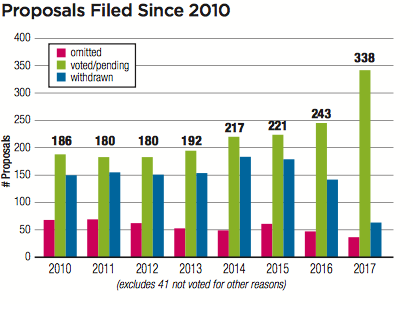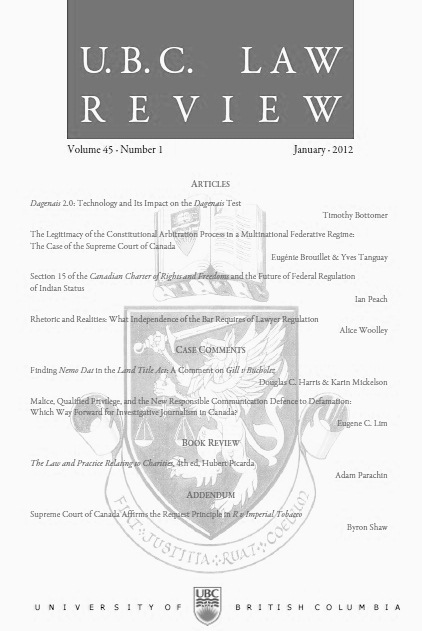engagement et activisme actionnarial Gouvernance normes de marché rémunération
Shareholders flex their muscles in 2017 AGM season to reduce FTSE pay
Ivan Tchotourian 24 août 2017
Bonjour à toutes et à tous, une récente étude menée sur les entreprises des indices FTSE100 et FTSE250 démontrent que ces dernières subissent de plus en plus la pression pour réduire le montant de la rémunération des hauts-dirigeants : « Shareholders flex their muscles in 2017 AGM season to reduce FTSE pay » (The Investment Association, 16 août 2017).
FTSE100 companies have listened and acted on 2016 investor rebellions, with a 35% decrease in 2017 remuneration resolutions that received over 20% dissent
FTSE250 companies were in the investor spotlight in 2017, with a 100% increase in companies getting 20% or more of votes against their remuneration resolutions compared to 2016
FTSE350 companies overall saw a 300% increase in votes against a Director re-election
6 FTSE350 companies withdrew resolutions on pay ahead of the company AGMs to avoid a shareholder rebellion
À la prochaine…
Ivan Tchotourian
engagement et activisme actionnarial Gouvernance normes de droit normes de marché Nouvelles diverses
Vote majoritaire : où en est-on au Canada ?
Ivan Tchotourian 27 mars 2017
Dans un article publié récemment (« Majority Voting: Latest Developments in Canada »), Stephen Erlichman revient sur la situation du vote majoritaire au Canada à travers les positions :
- du gouvernement fédéral avec le projet de loi C-25
- de la TSX dans un document publié en mars 2017 : « TSX Releases Guidance with respect to Majority Voting Policies and Advance Notice Policies » (du cabinet McCarthy tetrault)
- du gouvernement de l’Ontario : « Business Law Advisory Council Fall 2016 Report »
Une belle mise à jour !
A previous post on this site was written about (i) the Toronto Stock Exchange (“TSX”) adopting a majority voting listing requirement, effective June 30, 2014, which requires each director of a TSX listed issuer (other than those which are majority controlled) to be elected by a majority of the votes cast, other than at contested meetings (the “TSX Majority Voting Requirement”) and (ii) Bill C-25 which was introduced by the federal Canadian government on September 28, 2016 and proposes amendments to the Canada Business Corporations Act (“CBCA”) that include true majority voting (i.e., by requiring shareholders to cast their votes “for” or “against” each individual director’s election and prohibiting a director who has not been elected by a majority of the votes cast from serving as a director except in prescribed circumstances) (the “Bill C-25 Amendments”). This post explains the latest developments in Canada with respect to both of these initiatives, as well as a further development with respect to majority voting in the Province of Ontario.
À la prochaine…
Ivan Tchotourian
engagement et activisme actionnarial Gouvernance Normes d'encadrement normes de droit normes de marché Nouvelles diverses
Code de gouvernance en Allemagne : la responsabilité des investisseurs réaffirmée
Ivan Tchotourian 20 mars 2017
Le Code de gouvernance allemand vient d’être réformé récemment : « Germany corp gov code to emphasise investor responsibility » (Susanna Rust, IPE, 15 février 2017). Vous trouverez dans cet article une belle synthèse de cette réforme.
Germany’s corporate governance code is being amended to emphasise that institutional investors have a responsibility to exercise their ownership rights.
The amendments follow a six-week consultation period that generated a strong response, both positive and critical, according to the government-appointed commission responsible for the code. The commission decided on changes to the code itself and the preamble, which sets out the spirit behind the code.
The preamble has been extended to argue that good corporate governance requires companies and their directors to conduct business ethically and take responsibility for their behaviour. The German word used by the commission for the latter is “Eigenverantwortung” – literally translated as “self-responsibility” or “own-responsibility”.
The guiding principle of an “honourable businessperson” (“ehrbarer Kaufmann”) was introduced to the preamble to reflect this.
À la prochaine…
Ivan Tchotourian
engagement et activisme actionnarial Gouvernance normes de droit normes de marché
Le temps de l’activisme… sociétalement responsable ?
Ivan Tchotourian 14 mars 2017
Dans GreenBiz, Keith Larsen revient sur l’activisme actionnariale sous un angle particulier : le fait que cet activisme s’oriente en faveur de la RSE et que cette tendance va connaître une croissance les temps prochains (« It looks like this year will be big for investor activism », 14 mars 2017).
Amid unprecedented uncertainty about the Trump administration’s commitment to environmental and social issues, investors are relying more heavily than ever on companies to take action on initiatives such as addressing climate change, conserving water or reducing waste.
So far in 2017, shareholder resolutions specifically related to social and environmental issues have increased to 430 from 370 resolutions last year, according to As You Sow’s annual Proxy Preview.
According to the report, resolutions related to climate change and political activity underlie much of the shareholder activist sentiment thus far in 2017. Overall, environmental policies were the subject of 26 percent of the proposals filed, while corporate disclosures related to political activity accounted for 21 percent of the proposals filed. Suggestions related to human rights (18 percent), sustainability programs (12 percent) and diversity (11 percent) rounded out the top five.
The Proxy Preview provides an overview of environmental, social and sustainable governance resolutions filed in 2017 in preparation for « proxy season, » when shareholders of public companies vote on new boards and a range of issues during annual meetings.
(…) A rise in investor activism
Shareholder resolutions, also known as shareholder proposals, are part of a larger trend of shareholder activism in ESG issues.
A recent study by Harvard University found that about 40 percent of shareholder proposals on the Russell 3000, an index that is a benchmark for the entire U.S stock market, are related to ESG issues, a 60 percent increase since 2003.
While the study found that most of these ESG proposals fail to receive majority support, it also found that these resolutions nonetheless can improve a company’s attention and performance on the ESG issue in question.
À la prochaine…
Ivan Tchotourian
autres publications engagement et activisme actionnarial Normes d'encadrement normes de droit normes de marché rémunération
Say on pay obligatoire : l’IGOPP doute
Ivan Tchotourian 18 août 2016
Excellent texte auquel je viens d’accéder rédigé par Yvon Allaire et François Dauphin daté du 11 août 2016 et intitulé : “Making Say-on-Pay Vote Binding: a Good Idea?” (IGOPP).
Petit extrait :
The challenge of reading and understanding the particulars of executive compensation has become far more daunting. Indeed, for the 50 largest (by market cap) companies on the TSX in 2015 that were also listed back in 2000, the median number of pages to describe their compensation went from 6 in 2000 to 34 pages in 2015, ranging all the way up to 66 pages. Investors with holdings in dozens or hundreds of stocks face a formidable task. The simplest way out is either to vote per the stock’s performance or, more likely, rely on the recommendation of proxy advisory firms (which also base their “advice” on relative stock market performance. (…)
Boards of directors, compensation committees and their consultants have come to realize that it is wiser and safer to toe the line and put forth pay packages that will pass muster with proxy advisory firms. The result has been a remarkable standardization of compensation, a sort of “copy and paste” across publicly listed companies. Thus, most CEO pay packages are linked to the same metrics, whether they operate in manufacturing, retailing, banking, mining, energy, pharmaceuticals or services. For the companies on the S&P/TSX 60 index, the so-called long term compensation for their CEO in 2015 was based on total shareholder return (TSR) or the earnings per share growth (EPS) in 85% of cases. The proxy advisory firm ISS has been promoting these measures as the best way to connect compensation to performance. (…)
At a more fundamental level, the setting of pay policies should be the preserve of the board, as Canadian corporate law clearly states. When egregious pay packages are given to executives, a say-on-pay vote, compulsory or not, binding or not, will always be much less effective than a majority of votes against the election of members of the compensation committee. But that calls upon large investment funds to show fortitude and cohesiveness in the few instances of unwarranted compensation which occur every year.
À la prochaine…
Ivan Tchotourian
engagement et activisme actionnarial Gouvernance Normes d'encadrement normes de droit normes de marché
Activisme au Canada : Brian Cheffins commente
Ivan Tchotourian 16 janvier 2016
Bonjour à toutes et à tous, je suis tombé par hasard ce matin sur cet article du professeur Brian Cheffins intitulé : « Hedge fund activism Canadian style« (UBC Law Review, vol. 47, no 1, janvier 2014). Cet article est l’occasion de revenir sur la notion d’activisme sous un angle canadien.
The forthright brand of shareholder activism hedge funds deploy became during the 2000s a significant feature of Canadian corporate governance. This paper examines hedge fund activism “Canadian style.” The paper characterizes the interventions hedge funds specialize in as “offensive” shareholder activism and uses a heuristic device, “the market for corporate influence”, to identify the variables that dictate how frequent such activism is likely to be. This analytical structure is used to explain why hedge fund activism has become part of the Canadian corporate governance landscape and has displaced at least partly a Canadian shareholder “culture of passivity.”
À la prochaine…
Ivan Tchotourian

